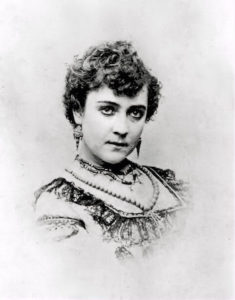
Adah Menken
On this date, we recall the birth of Adah Menkens in 1835. She was a Black Creole actress and poet of international renown in the mid-19th century.
Adah Bertha Theodore (her birth name) was from Chartrain, Louisiana. Confusing publicity stories in her later life obscured the facts concerning Menken’s early life. Her mixed-race father died when she was very young, and her mother was left without support until she remarried. A young Adah became fluent in several languages, including German, Spanish, and Latin, and displayed a talent for singing and dancing. She once claimed that in her youth, she rode horses in a circus, modeled for a sculptor, and danced at the New Orleans French Opera House.
She married Alexander Isaacs Menkens in Livingston, Texas, in 1856 and retained his name on the stage despite several subsequent and short-lived marriages.
In 1857, she appeared in “The Lady of Lyons” in Shreveport, Louisiana, and “Fazio” in New Orleans. She began to publish verses about that time; several poems appeared in the “Cincinnati Israelite” during the late 1850s and in the “New York Sunday Mercury” from 1860 to 1861. Menken first appeared on stage in New York City in March 1859.
But it was not until she opened in Albany, New York, in a dramatic adaptation of Lord Byron's “Mazeppa” in June 1861 that she achieved lasting recognition. Appearing in the play’s climactic scene, apparently (though not actually) nude and strapped to a running horse, she created a sensation. Strikingly beautiful, she was the central figure in a scandalous divorce case and a talented poet who received encouragement from Walt Whitman. She numbered such literary men as Mark Twain, Bret Harte, and even Henry Wadsworth Longfellow among her friends and admirers. Menken's fame preceded her to London, where she made her debut in “Mazeppa” in 1864. Her literary associates there soon included Charles Dickens, Algernon Swinburne, and Dante Gabriel Rossetti.
In 1865, she had a run-in in New York City, and the following year, another. She then made a successful United States tour before returning to Europe in 1866. Everywhere she traveled, she played before record audiences. Her performances in such pieces as “Dick Turpin,” “The French Spy,” “Three Fast Women,” and “The Child of the Sun” were generally well-received, but always the demand was for “Mazeppa.” She performed extensively in Paris and Vienna, returning to London in 1867.
She gave what proved to be her last performance at the Sadler's Wells Theatre in May 1868. Her “Infelicia” (1868), a collection of poems dedicated to Dickens, was published posthumously in London. Adah Menkens died on August 10, 1868, in Paris, France.
The Ghost Walks:
A Chronological History of Blacks in Show Business 1865-1910
Henry T. Sampson
Scarecrow Press (Metuchen, NJ., 1988)